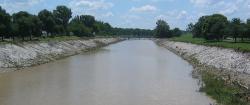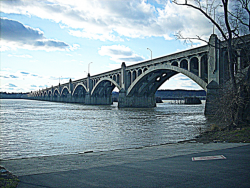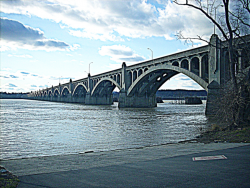In 1915, a tropical storm dropped nearly 11 inches of rain on St. Louis in just 17 hours, causing a devastating flood. Claiming 11 lives and the homes of 1,025 families, the flood focused public and government attention onto the problems of the river.
Concrete

The 1.5 mile Lacey V. Murrow Bridge was the largest floating structure in the world and the first to be built of reinforced concrete when completed in 1940. The bridge consisted of typically 300-foot long pontoons floated to site and rigidly connected to form a continuous structure and incorporated a unique floating concrete draw-span to allow for passage of marine traffic. The original floating structure, constructed by Pontoon Bridge Builders, was accidentally sunk in 1990 during a major renovation effort and was replaced by 1993.

The total length of the Columbia-Wrightsville Bridge is 7,374 feet. Its construction required 100,000 cubic yards of concrete and 8 million pounds of steel reinforcing rods.

The quantities of materials used in the building are staggering: 12,000 tons of structural steel; 42,000 cubic yards of concrete - consisting of 65,000 barrels of cement and 25,000 tons of sand; 360,000 feet of piling; and 10,000,000 bricks. At the time of its construction, Atlantic City Municipal Convention Hall was believed to be the world's largest hall, capable of seating 40,000 people. It continues to serve as a meeting place for shows, pageants, sporting events, and conventions. It is a structure of heroic proportions.
Innovations

The quantities of materials used in the building are staggering: 12,000 tons of structural steel; 42,000 cubic yards of concrete - consisting of 65,000 barrels of cement and 25,000 tons of sand; 360,000 feet of piling; and 10,000,000 bricks. At the time of its construction, Atlantic City…
Read More
The total length of the Columbia-Wrightsville Bridge is 7,374 feet. Its construction required 100,000 cubic yards of concrete and 8 million pounds of steel reinforcing rods.
Consisting of 28 arches, each 185 feet long, the Columbia-Wrightsville Bridge carrying automobile traffic…
The 1.5 mile Lacey V. Murrow Bridge was the largest floating structure in the world and the first to be built of reinforced concrete when completed in 1940. The bridge consisted of typically 300-foot long pontoons floated to site and rigidly connected to form a continuous structure and…
Read More
In 1915, a tropical storm dropped nearly 11 inches of rain on St. Louis in just 17 hours, causing a devastating flood. Claiming 11 lives and the homes of 1,025 families, the flood focused public and government attention onto the problems of the river.
In the early 1900s, St. Louis…
Read More

